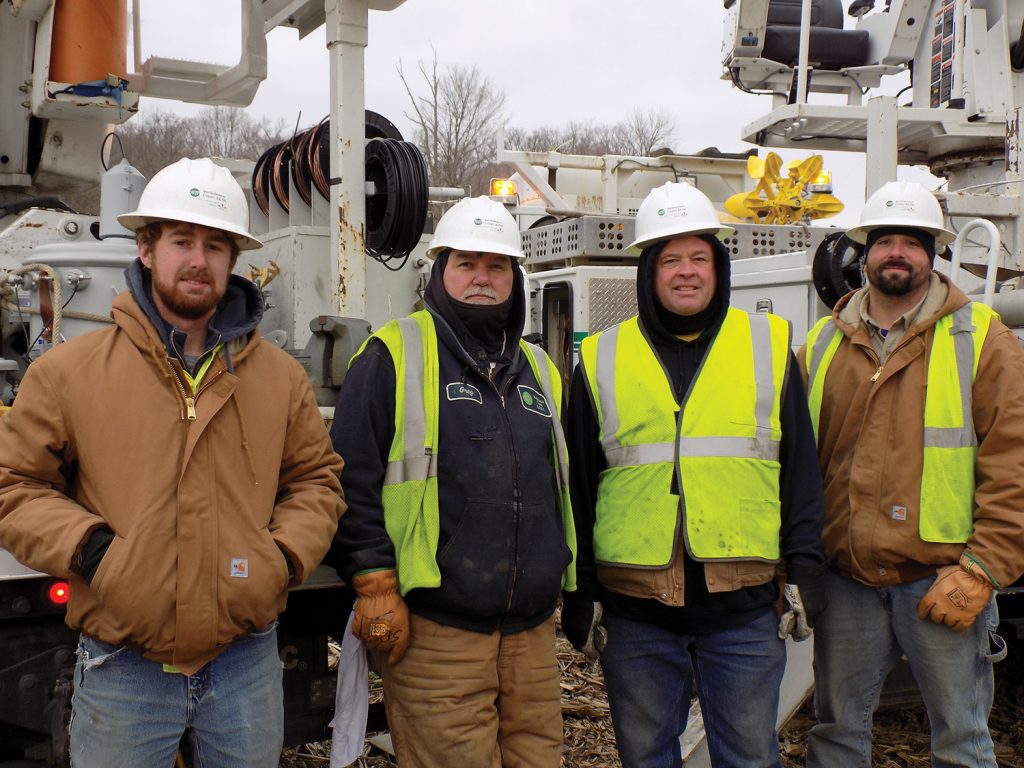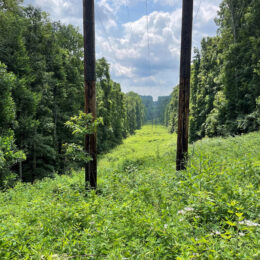

CEO
Recognized as one of the most dangerous professions in the United States, lineworkers are known for their strong physical endurance and mental toughness. Every day, 10 of these skilled professionals at BCREMC help deliver electrical power from our substations into your homes, farms, and businesses.
Being a lineworker is a physically demanding job — partly because of the task at hand and partly due to the exposure to the conditions, rain, snow, extreme cold and heat, and the dark of night. One job might require climbing a 40-foot pole while the next might demand installation and repair work in 35 mph wind gusts. I am continuously grateful for our lineworkers’ commitment to safely “turning the lights back on” for our members regardless of the time of day or the elements. From construction, troubleshooting, maintenance and restoring power during outages and storms, it is no wonder lineworkers are often referred to as the heart of our cooperative.
I wanted to shine this month’s spotlight on one of our crews. On a cold January day, we met up with these lineworkers in a field where they were rebuilding a line near S 450 E and 750 S. Working together, it is obvious these lineworkers enjoy each other’s company, just as much as they enjoy their jobs. We sat down with them to get a glimpse of what a day on the job looks like and what they value most about their roles. They are Journeyman Linemen, Greg Shelton and Paul Ward and Apprentice Linemen, Cody Kildow and Jonah Brewer.
Can you walk us through a timeline of a “typical” day?
All: Line crews begin the day at 7:30 a.m. We gather and load the truck with material that is needed from the warehouse specific to the job. Once everything is loaded, we leave the shop for the job site. When we arrive, we make the work site safe by displaying any required signage that informs the public there is work being done in the immediate area. Before anyone leaves the ground to start work, we’ll discuss the job in what we call a ‘tailgate meeting’ which informs all crew members of potential hazards and ensures that everyone is on the same page. Safety is the most important part of our job! We normally stop at 11:45 to take our lunch. However, there are times when we must work through our lunch (usually if there is an outage). Once the job is complete, we’ll get back to the shop to unload the material, clean up, and go home at 4 p.m.
How did you become a lineman?
Paul: In my geographical area there weren’t a lot of jobs without traveling long distances. I saw how well others were doing in the field of line work and thought it paid well.
Greg: Jerry Newlin was line superintendent here at the time. I met Jerry through church. During a church fishing trip to Canada, he suggested I try to get hired and work on the utility business.
Cody: I used to go to the linemen rodeo in Bonner Springs, Kansas, when I was growing up. I always wanted to climb poles like they did in the linemen rodeo.
Jonah: I had a friend that was older than me that became a linemen and really enjoyed it. I also did a job shadow in high school here at BCREMC and knew it was something I wanted to do.
What’s your favorite part of the job?
Greg: Throwing in a cutout (a fuse on the distribution system) and it doesn’t go boom. Then the lights come on.
Paul: The freedom I have of not being inside a building for eight hours or more. I tried inside work as well and I went back to line work. Being able to have some control over what I’m doing during the day is nice too.
Jonah: Performing hot line work. This is working the line energized at 7200 volts to keep the power on.
Cody: Camaraderie between the workers.
What’s the hardest part of your job?
Paul: Each day we all have a game plan as to how things will go. As a crew we set goals each day as to what we want to accomplish. At times, the obstacles are too great, and our goals fall short. That’s the hardest for me, not being able to accomplish our goal on some days.
Greg: Ice storms, they make me work way too hard!
Cody: Missing family birthdays, Christmas, Thanksgiving, etc., when there are outages.
Jonah: Performing hot work (keeping the line energized) is challenging. Truck setup and hot work can be a tedious job.
What do you wish the customer understood about your job?
Greg: The customer only sees us during the daytime hours. They see us talking behind the truck and think that’s all we do. The consumer doesn’t see us working from midnight to 6 a.m. on a broken pole and realize you had to be back at work at 7:30 a.m.
Paul: I wish they understood how much planning, preparation, and time it takes to try and do a job efficiently
Jonah: I want them to know to slow down when the trucks are working. It’s dangerous just being on a road.
Cody: How dangerous our job is. Also, that outages can take longer than expected to restore. I hope they know that we are away from our family trying to get outages restored as fast and safe as possible.
What advice would you give others looking at becoming a lineworker?
Paul: It’s a rewarding job in many different ways. You can contribute to your community, and make a difference each day at work. You help others and it pays really well.
Greg: Take the new climbing/linemen schools that are available. There are good ones out there.
Cody: Being a lineman, you can make a great living and support your family. Make sure you are willing to get out of bed at 3 a.m. when it’s snowing and 10 degrees to restore power. This is not for everyone. Be cautious, electricity is not something to play with.
Jonah: Make sure you are not afraid of heights!
What has being a lineman taught you?
Greg: Family is not only your relatives. The guys you work with become brothers.
Paul: It’s taught me a lot of life lessons throughout my time.
Cody: It has taught me respect. You must respect the linemen around you and teaching you how to do things safely. You also must respect electricity. Electricity is always trying to find a source to the ground, If you aren’t careful you will become that source.
Jonah: To be patient.
Can you describe the culture of the lineworker environment? Can you share what it’s like to be part of the team and what that means?
Paul: We are a caring group overall and function well together toward a common goal. As a team it’s a lot easier to reach our goals each day or help someone to reach theirs. It gives you the feeling of accomplishment.
Greg: I really like the group we have now. The new guys, apprentices and linemen are great to work with and camaraderie has formed along with respect.
Cody: Camaraderie is the best way to describe the culture of the linemen. We all look out for each other and keep each other safe. All that matters is everyone gets to go home to their family in one piece every day.
Jonah: Being a part of this team makes me proud and it means I want to come to work every day and the culture is very tight knit.
What are the skills needed to perform this line of work?
Greg: Electrical understanding, willing to work whenever called and have a CDL license.
Paul: Dedication, determination, leadership qualities, patience and understanding.
Cody: Respect, strength, leadership, and knowledge.
Jonah: Be patient and able to work out problems on the spot.
What keeps you motivated coming to work each day? Aside from your crew, why do you enjoy this job? Why is it important? What does it mean to you?
Paul: I like this type of work, I got tired of traveling with contractors. I like the people here at Bartholomew County REMC. I like Columbus and the area. To me it’s like a second home, since I’m from Kentucky. I’m comfortable here though.
Greg: Work ethics instilled in me by watching my dad. The accomplishments of seeing the silver glow in the air of new wire. It will be there for a long time and I will know that I put it there.
Cody: I am motivated to provide for my family. I enjoy turning people’s power on and seeing them smile, knowing they can enjoy their normal life again. It is important to provide a service for our community knowing that we are the only people that can help in their time of need.
Jonah: Nobody else my age (22) can do what I do, except a select few, and I take great pride in that.
Thank you to all our crews for the incredible work and heart that is poured into each day, 365 days a year!



